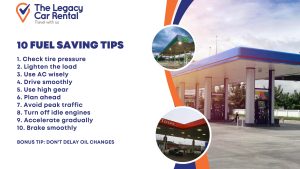 10 Sure-fire Ways to Save Money on Fuel
10 Sure-fire Ways to Save Money on Fuel
While fuel prices aren’t as erratic as they once were, finding ways to save money remains essential. In this guide, we’ll explore effective strategies for cutting down on fuel costs, enabling you to reserve more funds for the exciting Easter holiday season. Get ready to discover practical tips that can make a real difference!
Keep tyres pumped up
One of the main causes of high petrol consumption is under-inflated tyres. Tires that are underinflated have a higher rolling resistance on the road. This means that with every kilometre travelled, your tyres generate more friction and rolling resistance, and hence, will increase fuel consumption. If all your tyres are underinflated by 10 psi, this could reduce fuel efficiency by up to 10%. Simply make sure that your tyres meet the car’s recommended tyre pressure to avoid this
Lose the weight in your boot
For those with a habit of keeping everything and anything in the boot, in addition to emergency spares, think twice when loading up next time. It’s been proven that the heavier the load your car is carrying, the higher your car’s fuel consumption will be. Every extra 50kg your car puts on increases fuel consumption by 2%. It’s recommended that you don’t carry unnecessary items in your car, like additional clothes, shoes and other items.
Use your air-conditioner smartly
Most of us usually turn on the aircon at full blast as soon as we go into the car, and that’s a normal reaction due to the weather in Zimbabwe. It’s been proven that the air-conditioning can increase your petrol consumption by up to 20%. However driving with the windows down at speeds faster than 80km/h causes a lot of wind resistance, and costs you a lot more fuel. Contrary to what you may think, in this situation, it’s simply more fuel efficient to drive with the aircon on. Our suggestion is to keep your aircon at low, if possible for more fuel efficiency.
Don’t go too fast or too slow
When cruising down a highway, your engine works hard to overcome wind resistance. You’ll burn up to 15% more fuel at 100 km/h and 25% more at 110 km/h. That might tempt you to drive slowly, but if you drive slower than 50 km/h, your engine would drop to a lower gear, thus using up more fuel. In conclusion, a steady 50 – 90 km/h on the highway is best to achieve optimal fuel economy.
Go easy on the accelerator
Going fast is a surefire way to use more fuel. Avoid revving your accelerator to a high revolutions per minute (RPM). Ease up a bit and you’ll be surprised how much you save. It’s better for fuel economy, as your engine uses less fuel when it is revolving slower, at a lower RPM.
Avoid braking aggressively
Slamming on the brakes increases fuel consumption as you need to accelerate again later. This is especially true if you follow too closely behind the vehicle in front of you. Not to mention, tailgating is dangerous and something to avoid. Where possible, try to slow down gradually and anticipate stops early.
Practice predictive driving
Look to the road ahead and plan your next move. Instead of slamming on the brakes to a complete stop, try slowing down as you approach the red light. Or when reaching the foot of a hill, start accelerating as you edge closer to it rather than when you approach it. Avoid hard accelerations when moving your car from a complete stop, or climbing a hill as it will increase fuel consumption.
Don’t stay idle for long
As Zimbabweans we are especially good at idling in our cars, along with double parking to wait for errands. However, an engine that idles for more than 10 seconds uses more petrol than it takes to start it. Always turn off your engine if you’re planning on waiting for someone to do a quick errand. You may not be moving but as long as your engine is on, it’s burning precious fuel.
Cruise in top gear
If you’re driving an automatic car, make use of cruise control to keep your speed constant. And if you’re driving a manual car, maintain a higher gear when appropriate. In each of these instances, your engines go through less revolutions per minute (RPM) and will reduce your fuel consumption.
Plan your rush hour route
Stop-start traffic puts a lot of pressure on your engine, thus burns more fuel. When possible, plan your commute to and from work carefully to help you avoid the worst of peak traffic.
Bonus Tip: Don’t put off an oil change
Regular car servicing and using high-quality engine oil help maintain fuel efficiency by reducing engine friction and preventing sludge buildup. If your car is poorly maintained, it can probably use up as much as 25% more petrol than a normal car. To counter this, just keep up with your car’s regular maintenance by taking your car in to your dealership or a trusted mechanic.
Remember: These practical adjustments can make a big difference in fuel consumption over time.